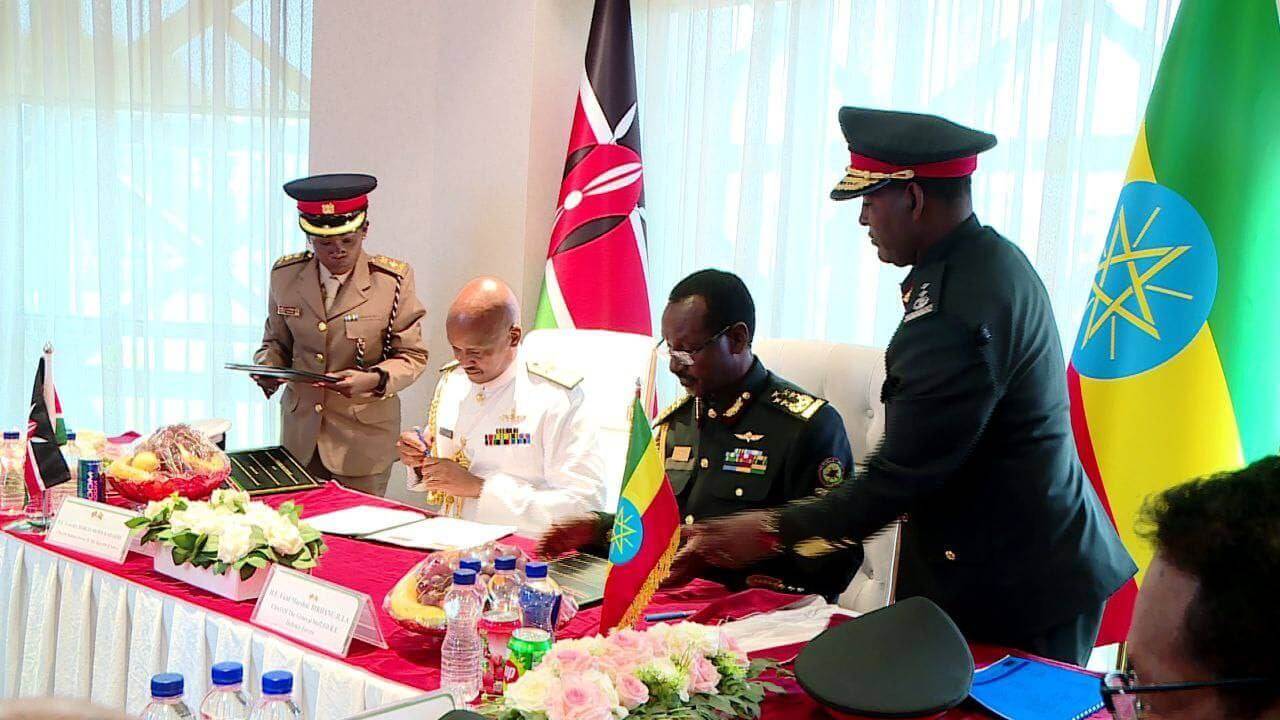Ethiopia and Kenya have signed a new Defense Cooperation Agreement (DCA), more than six decades after the first such pact was concluded in 1963, the year Kenya gained independence.
The Ethiopian National Defense Force (ENDF) announced on 24 September that the agreement was signed at the Ministry of National Defense Headquarters in Addis Abeba, following a bilateral meeting between Field Marshal Birhanu Jula, Chief of General Staff of the Ethiopian Armed Forces, and General Charles Muriu Kahariri, Kenya’s Chief of Defense.
According to the ENDF, the agreement builds on “longstanding defense ties” and provides a “strategic framework” for the two countries to cooperate on key security matters. Unlike ordinary agreements, a DCA is signed “when the relationship and trust between the parties are growing,” the ENDF said.
Field Marshal Birhanu underscored that Ethiopia and Kenya share a historic relationship, which has been reflected in their “longstanding military cooperation”. He said the new agreement will expand collaboration in “intelligence sharing, joint military exercises, training, defense industry development, counter-terrorism, border security, and related military matters”.
“Beyond benefiting the two countries, the agreement will have a positive impact on regional peace and security,” Birhanu stated.
General Kahariri, for his part, thanked Ethiopian authorities for what he described as the “warm and vibrant welcome” accorded to him and his delegation. ENDF quoted him as saying that the relationship between the two neighbors is not only historical but also “rooted in cultural, geographic, and people-to-people ties.”
The newly signed agreement carries “significant benefits for peace and stability in the region beyond Ethiopia and Kenya,” he said, reaffirming his country’s commitment to strengthening cooperation with the ENDF in future engagements.
The signing of the DCA follows a series of military engagements between the two countries in recent years.
In February 2024, Field Marshal Birhanu and then–Chief of Defense Forces of Kenya, General Francis Ogolla, met in Nairobi for talks described by the Kenyan Defense Forces (KDF) as focused on “enhancing military relations stemming from the rich cordial relationship between Kenya and Ethiopia.” The two sides pledged closer cooperation to address shared border security challenges, including contraband trade, drug trafficking, and human trafficking.
Subsequent meetings were also held. In November 2024, General Kahariri led a Kenyan military delegation to Addis Abeba, where discussions with the ENDF focused on expanding collaboration in training and joint security operations. The ENDF said at the time that both sides agreed to “strengthen their collaboration in the military sector to sustain and further develop their partnership.”
On 29 February 2025, Field Marshal Birhanu and General Ogolla again met in Nairobi for another round of talks on regional peace and security, held shortly after Prime Minister Abiy Ahmed’s state visit to Kenya. That visit concluded with a joint statement aimed at deepening bilateral ties across multiple sectors.
Earlier this year, the National Police Service (NPS) of Kenya launched Operation Ondoa Jangili in Marsabit and Isiolo counties to “flush out hideouts” allegedly used by the Oromo Liberation Army (OLA).
In a statement on 3 February, the NPS said the operation targets “criminals conducting illegal operations” that threaten national security, including “arms, drug and human trafficking, illegal mining,” and “instigating tribal conflicts and kidnapping for ransom” in Sololo, Moyale, North Horr, and Merti sub-counties. Senior officials, including Deputy Inspector General of the Administration Police Service Gilbert Masengeli and Director of Criminal Investigations Mohamed I. Amin, attended the launch in Marsabit County.
The OLA, however, denied involvement in the listed criminal activities. In a statement, it said it “fully respects Kenya’s sovereignty and territorial integrity,” claiming that “over 95% of our Southern Command forces operate deep within Oromia,” with only a limited presence near the border. The group added that it remained committed to “the safety and security of the Borana and other brotherly Kenyan communities” and expressed willingness to “cooperate with Kenyan authorities in addressing criminal elements along the border.”
Both countries also express desires to play pivotal roles in regional counter-terrorism efforts, particularly in Somalia, where they have contributed troops to African Union Support and Stabilization Mission in Somalia (AUSSOM).

